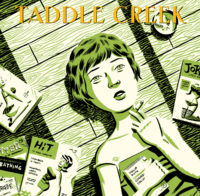Taddle Creek just loves to capitalize words. In fact, it often has to restrain itself from capitalizing every word it sees. But restrain itself it does (and quite professionally so), resulting in a surprisingly liberal use of lower-case letters in its pages.
Proper nouns are another matter entirely, however, and the magazine is becoming alarmed at the increasing number of people who dare to lower-case them. Those who would do so most commonly defend their actions by claiming the words in question have become “common.” Taddle Creek argues that, by definition, there is nothing common about a proper noun.
A proper noun is the name of an individual person, place, or thing, and is thus spelled with a capital letter. The name “Steve” is a proper noun, as is the name “Chicago.” And, as discussed previously on this page, the World Wide Web is also a proper noun.
Words derived from proper nouns are also capitalized, such as “Chicagoan” (a resident of Chicago), and “Web site” (don’t get Taddle Creek started).
While surely no one would argue for lower-casing the name of an individual person or place, matters get a little greyer when it comes to the “things” category. Take “Manhattan” (a drink comprised of whisky, vermouth, and bitters, topped with a cherry, and named, either directly or indirectly, after the New York borough), “Chesterfield” (a type of couch, thought to be named for the Earl of Chesterfield), and “French fry” (a fried potato that may or may not have been developed by the French, but which takes its name from them nonetheless). All three words are derived from proper nouns, and for many years were capitalized without question. But open up a recent copy of the Canadian Oxford or Merriam-Webster’s dictionaries and you’ll see evidence of the trend to lower-case these fine words.
Why? Once again, because dictionaries have become followers instead of leaders: “If we notice that a word is being commonly lower-cased, we reflect that in our dictionary, even if that results in a certain amount of inconsistency,” Lisa Devries, a lexicographer with Oxford University Press Canada, recently told the magazine.
Look no further than the letter F in Oxford’s pages for a prime example of this: it’s “french fry,” but “French bread.” Sure, more people probably eat French fries than French bread, but come on…
And how about that loveable friend to all, the teddy bear, named in tribute to the former U.S. president Theodore “Teddy” Roosevelt (ironically, a bear hunter). “Teddy bear” is lower-cased in Oxford, but look one entry below and you’ll find “Teddy boy,” the Edwardian-style revival fifties youth with that wonderful haircut Taddle Creek so admires. Oxford upper-cases it, seemingly because it is no longer in common use. But really—no one says “Chesterfield” any more either. (Webster’s lower-cases them both.)
The Canadian Press, in its style guide, takes matters to the extreme, lower-casing “Ferris wheel.”
Many people confuse proper nouns with trademarks. And while trademarked names are still proper nouns, they are different in that they are legally registered entities, such as Kleenex or Dumpster. Thus, their capitalization is protected by law.
Taddle Creek likes that kind of law. Sadly, there is no law to protect the memories of the Earl of Chesterfield, King Edward VII, or George Washington Gale Ferris, Jr. Until there is, Taddle Creek will do its part to keep their memories alive in its pages, even if it means defying the dictionaries yet again.
